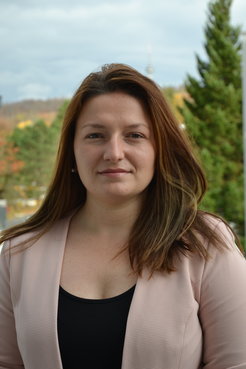Alexandra Botnariuc
PhD student in the “Pulsars” group

What is your current position at our institute?
I'm a first-year PhD student in the “Pulsars” group.
How and when did you choose to do physics?
I always had an affinity for mathematics but when I was first introduced to physics in school, I was hooked. I just love the challenge of physics and am still trying to understand, learn and conquer it. How do you know what assumptions to make? How can you get a real world answer from abstract thinking?
What is your academic education?
- BA Natural Science Tripos (Experimental and Theoretical Physics), Cambridge University
- MSc Computational Science and Engineering (with Physics), University of Rostock
What were your previous academic positions?
None, but I did work as a programmer for four years and as a bioinformatician for one year.
How would you explain your research in language understandable to scientists from other fields?
I'm looking for new pulsars, i.e. rotating very compact remnants of exploded stars which are “visible” because of their pulsed radio emission. One of the first things I'm working on is reducing the number of signal candidates we already have from a search for binary radio pulsars on our distributed volunteer computing project Einstein@Home.
Do you have a favourite figure from a paper you (co-)authored?

I have yet to publish a relevant paper but one of my current favourite things is this (super-secret) website that I build where I have a summary of known pulsars folded on telecope data, both with known parameters and the Einstein@Home results.
Please let us know why you chose the Max Planck Institute for Gravitational Physics for your research.
The institute came to my attention through the news of the first gravitational wave detection. I was not aware of this type of research and thought they are the pinnacle of what I want to do: Computational Science. I never thought I would get a PhD offer here, but ultimately the reason I chose it, except the very good fit with my scientific interests was the warmth, dedication, directness and uncomplicated nature of the people I work with.
What would you recommend to a young woman wanting to start a career in physics?
Ignore any and all discouragement, keep trying and just know that to have success in any field you must face rejection and adversity 90% of the time.

